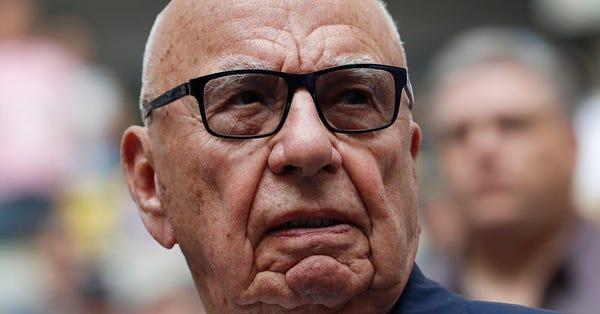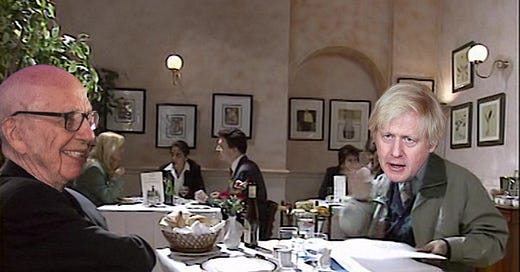"A casual lunch between friends..." Unpicking the cosy chats that enable the media/government love in
Listing the occasions that corruption happened does not constitute transaprency.
Imagine you’re having lunch with Rupert Murdoch. You ignore the fact that the Bloody Mary he has ordered appears to contain real blood, that his starter is a bag of tormented souls, and that his drink of choice is a Martini made with the distilled tears of vanquished enemies.
This is just a ‘casual lunch between friends’ and you certainly aren’t just waiting for a chance to swear fealty to him in return for support for your political ambitions. As Rupert eats live rat babies by the handful, you excuse yourself. You catch sight of yourself in the mirror and a pallid face of horror stares back at you — you have awoken one morning from uneasy dreams and found yourself transformed into a gigantic Jacob Rees-Mogg.


The Press Gazette reports that editors/executives from News UK have met with Boris Johnson and his top ministers 40 times since he became Prime Minister in July 2019. The next most favoured organisation — Daily Mail & General Trust, owners of The Daily Mail, Mail on Sunday, MailOnline, The i and Metro — had less than half the chances to wheedle the PM and Cabinet (16 meetings).
Murdoch has met the Prime Minister three times since he assumed office — once in a ‘social setting’ in September 2019, at another ‘social event’ in December 2019 and once for a ‘general discussion’ in September 2020. If you find those descriptions vague and frustrating that’s deliberate. Conversations between the Prime Minister or his ministers and media bosses and top editors aren’t minuted and their content is given the blandest of descriptions.
For all we know, the Boris Johnson/Murdoch meetings are the politican equivalent of Alan Partridge pitching a new series to Tony Hayers:
“Alright, uh, monkey prisons… um… Reintroducing The Death Penalty presented by Priti Patel and Chris Eubank…”
That there are even lists of behind-the-scenes interactions between the media and government is a hangover from the Cameron-era and I wouldn’t be surprised if, like so many of his ‘innovations’, it was soon cast into the dustbin of history by the Johnson administration. Cameron introduced the records of meetings between ministers/civil servants and media proprietors, senior editors, and executives in July 2011, the same month that he announced the Leveson Inquiry.
The lists are kind of ersatz transparency; yes, they show which ministers have been huddling up with which media organisations but without any detail on what was discussed it’s basically dead data. The corruption inherent in Rupert Murdoch being able to buy his way into private chats with the Prime Minister — something he has done since the Thatcher years — is not dissipated simply by the mere existence of a list showing how often it’s occurred.

As well as meeting with Johnson, Murdoch paid for lunch with Rishi Sunak (part of the Eat Out to Get Clout scheme), had a “private dinner” with Michael Gove (his former employee) and had an “informal lunch between friends” with Jacob-Rees Mogg (whose father William had once disdained Murdoch but was bought off by a late period back at The Times as a columnist). Rebekah Brooks, Murdoch’s representative on Earth, also met with Johnson and Sunak in September. News Corp chief executive Ropert Thompson also availled himself of cosy chats with the Chancellor and Prime Minister.
Current Sun editor Victoria Newton met Johnson and Sunak last summer. Newton’s predecessor Tony Gallagher, now deputy editor at The Times, had most meetings with the Prime Minister prior to that, coming joint first for the total of cosy ministerial conflabs with ‘World’s Worst Chris Evans’ Telegraph editor… uh… Chris Evans. Geordie Greig, editor of The Daily Mail, took third place with three meetings with the Prime Minister and six meetings with other ministers.
Fraser Nelson, editor of far-right fanzine The Spectator, which despite Andrew Neil’s attempts to fiddle the sales figure graphs sells far south of 100,000 copies a week, slipped in to see the Prime Minister twice and met other ministers three times. Still, that’s an embarassingly low number when you remember that in an earlier more affair-filled life Boris Johnson himself edited The Spectator.
Even within the ‘transparent’ data there’s even more obsfucation: Priti Patel, the Home Secretary and part-time ring wraith, met with Murdoch on 14 September 2020 but it’s not listed like that. Instead it is recorded as “a private dinner” with the “Executive Chairman of News Corp”.
While Patel may be confused, she did, of course, get fired from her previous ministerial office for running a freelance foreign policy, it’s not actually acceptable for the holder of a great office of state to pass off a meeting with the country’s most powerful media baron as “a private meeting”. Similarly, while Murdoch was one of daddy’s pals (and bosses), Jacob Rees-Mogg is Leader of the House of Commons so their ‘chats’ are likely to include more than a discussion of what makes a good nanny and how delicious swan’s blood tastes.
The relationship between the right-wing press and the Conservative government is just accepted, treated as though it is simply an immutable law of physics. That’s why no one makes much fuss about James Forsyth having a column in The Times every Friday which he uses to boost Boris Johnson while his wife waits in the wings as Johnson’s official spokesperson. Nor are we meant to be unhappy about Sarah Vine, whose husband is Michael Gove, writing columns for The Daily Mail which oscillate between pretend ignorance about what the government is doing and indiscrete revelations about other politicians.
At Gove’s delightful dinner with Mr Murdoch — his former boss at The Times, to which he returned to briefly in 2017 to interview Donald Trump (with Murdoch in the room) — there were two other guests: Sarah Vine and a third party whose identity is not disclosed in the list of meetings. A week after the Murdoch dinner last August, Gove and another unnamed guest met with his wife’s boss, Daily Mail owner Lord Rothermere.
Curiously, Katharine Viner at The Guardian (who has been in her job since 2015) and FT editor Roula Khalaf (in post since January 2020) have not been granted a single meeting with the Prime Minister. It’s almost as if these meetings are not ‘private dinners’ or a ‘casual lunch between friends’ but, in fact, political carve ups where the Prime Minister and his Cabinet of Horrors jockey for position and find out what Murdoch and others require to stay friendly.
The media meetings list is so empty of content and context because if we were allowed to know what was discussed those chats would instantly become useless. The silence and the secrecy is necessary because these are not simply the cogs of media and government meshing, but acts of corruption perpetrated in half-light. This is transparency only in so much as a frosted bathroom window is transparent — you can tell when something grotesque is happening on the other side of the glass but you just can’t quite make out the details.



